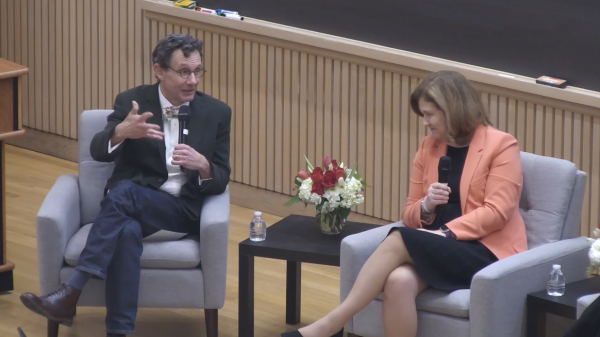
On Tuesday, Feb. 25, President Steven Tepper spoke on a panel at Colgate University on “The University and the Public Good: The Role of the American College.” Moderated by Colgate President Brian W. Casey, the panel included Lafayette College President Nicole Hurd and Grinnell College President Anne F. Harris as well.
Casey opened the panel with the question, “What is this moment [in higher education]?”
“I’ve been a college president for 17 years and I’ve watched higher education for close to 30–this feels intense, important, and unnerving,” he said.
“We’re living in the catastrophe,” Harris responded. “I’ve been thinking a great deal about how to encapsulate what we’re living through.”
“I think we’re seeing the great transition from colleges being what everyone aspired to and believed in to the diploma divide,” Tepper added. “Instead of universities and colleges being this sort of great hope for transformation and social mobility, they are perceived to be to be oppositional to that.”
Casey pointed out that the “attack” on higher education seems to be coming from the “hyper-educated,” citing Vice President J.D. Vance who went to Yale Law School and President Donald Trump who went to the University of Pennsylvania.
Hurd said that she believes the critique of a college education is coming from “all around.” She spoke about her 15 years of work as the founder of a college-access organization called the College Advising Corps, where recent graduates are placed at low-income, under-resourced high schools to support first generation, low-income and underrepresented students in their path to college. “I can tell you, after doing that work, that rural America is very interested in the value proposition of higher education,” she said.
“I always get, specifically, [the question] ‘Why does Colgate, or why do these schools hate America?’” Casey said to the panelists.
Hurd said the answer to this question in part involves representation. “When you’re working in low-income schools or schools where parents haven’t gone to college, [colleges] make it hard,” she said. “We’ve got financial aid forums, scholarships and applications, and the whole college process and financial process is a hot mess. It’s way too hard. So it makes people feel like they have imposter syndrome before they even get to a campus.”
Tepper said he believes there is a distortion of what colleges are from a cultural standpoint. “There’s so many different opinions and ideas [on college campuses], and so the mischaracterization that there’s like this orthodoxy, and everyone has to agree—it’s just not true.”
Casey then asked the panelists to share their thoughts on the Feb. 15 “Dear Colleague” letter from the U.S. Department of Education addressed to educational institutions receiving federal funds. The document notified these institutions that they must cease using race as a factor in their admissions, hiring, promotion, financial aid, scholarships and all other aspects of student, academic and campus life. “Institutions that fail to comply with federal civil rights law may, consistent with applicable law, face potential loss of federal funding,” the letter states.
“I read [the letter] in two different frames,” Casey said. “One is I read it and was like, ‘Okay, this is a call to arms; this is a threat. Then the lawyer in me read this and I’m like, ‘this is a mess.’”
“It’s political theater,” Tepper said. “I think we’ve all settled down to realizing that we don’t have to do anything different than we’re doing. There’s nothing in there that has been adjudicated in a way that suggests that we’re doing anything wrong or against the law.”
“I think this is an opportunity to take back the narrative,” Hurd said. “Part of the way we can handle the attack on higher education is to explain what our outcomes are, and our outcomes are something we should be really proud of.”
When discussing the implied critique of college curriculums in the “Dear Colleague” letter, Tepper proposed that colleges should have a question in their course evaluations about how well faculty were able to put ideas in competition with each other or how often the class challenged assumptions. “If we believe that kind of friction is actually what leads to truth and leads to growth, then we should ask about it. That’s also the question that America is asking us. They think we’re not doing it.”
Casey wrapped up the discussion by asking the panelists, “What is the most important thing for you as a college president to do in this moment of attack?”
Harris said that safeguarding bedrock principles and identifying those as civil rights is essential. “I want to count academic freedom and freedom of speech as instrumental to civil rights,” she said. “I do think it is so important that we have critique and dissent and disagreement within our institutions, because I do think our society continues to move forward through dissent and deliberation.”
Hurd emphasized that she wants to continue to inspire optimism. “I don’t think you can be an educator unless you’re an optimist,” she said.
Tepper shared a story about a recent conversation he had with a Ukrainian student at Hamilton whose relatives died in the war. Tepper said she told him that she needs to be at Hamilton because her family “will want [her] to be able to make a difference with [her] voice.”
“She has to build a voice that can push back against all that atrocity,” he said. “It’s such a privilege and an honor for us to try to be stewards of institutions that allow people to bring that kind of courage in order to have an impact in the world and to transform their lives.”